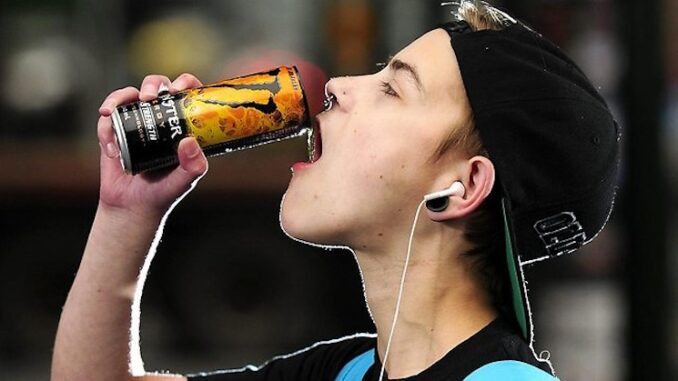
Energy drinks are responsible for the rise in suicide and severe mental health issues in children, according to a new study.
Researchers at Fuse, the Centre for Translational Research in Public Health at Teesside University, and Newcastle University discovered that energy drinks pose a greater risk to children than previously thought.

BYPASS THE CENSORS
Sign up to get unfiltered news delivered straight to your inbox.
You can unsubscribe any time. By subscribing you agree to our Terms of Use
Latest Video
Children who regularly consumed energy drinks were shown to have a higher risk of severe mental health issues such as depression, suicidal thoughts, and ADHD.
Nypost.com reports: In the review, published in the journal Public Health, researchers looked at data from 57 studies of over 1.2 million children and young people from more than 21 countries who consumed energy drinks.
The researchers conducted this review as a follow-up to an initial review in 2016.
“We have found an even greater list of mental and physical health outcomes associated with children and young people consuming energy drinks,” lead author Amelia Lake, professor of public health nutrition at Teesside University, told Fox News Digital.
“We repeated [the review] only to find an ever-growing evident space that suggests the consumption of these drinks is associated with negative health outcomes.”
The caffeine content of energy drinks ranges from 50 mg to 505 mg per serving, compared to 90 mg in 8.45 ounces of coffee, 50 mg in 8.45 ounces of tea and 34 mg in 16.9 ounces of soda, the researchers noted.
Based on the findings, the researchers and other UK health organizations are calling for the government to ban sales of energy drinks to children under age 16.
“This evidence suggests that energy drinks have no place in the diets of children and young people,” said Lake.
“Policymakers should follow the example from countries that have placed age restrictions on their sales to children.”
Experts weigh in
Erin Palinski-Wade, a New Jersey-based registered dietitian, was not involved in the new research but said its findings did not surprise her.
“Energy drinks are not a safe choice for children and no safe guidelines have been established for caffeine consumption in those under the age of 18,” she told Fox News Digital.
Caffeine has a half-life of six to eight hours, she noted — which means it takes that long for it to leave the system.
“Even small amounts of caffeine can impact quality and quantity of sleep, and poor sleep is directly correlated with a decline in both mental and physical health — in adults as well as children,” Palinski-Wade noted.
“A lack of quality sleep can lead to impaired cognitive functions such as decision-making, conflict resolution, working memory and learning, along with changes in behavior, mood and an increased risk of depression.”
Insufficient sleep can also negatively impact a child’s brain development, she added, which can lead to learning problems and more frequent negative emotions.
“A lack of sleep can also impact memory and concentration, making it harder to perform academically, especially if sleep is chronically interrupted,” the expert said.


